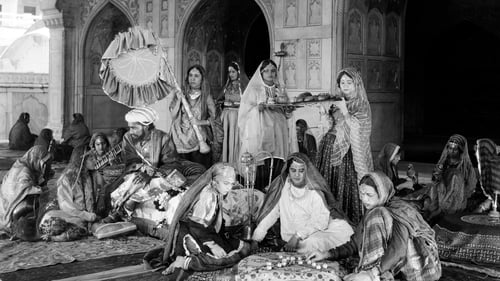Niranjan Pal
Nacimiento : , Calcutta, Bengal Presidency, British India [now India]

Sampat Pal, mujer de Uttar Pradesh, India, es la líder de una pandilla muy particular. Se trata de las “Pink Saris”, cuyo símbolo de distinción es la vestimenta tradicional india, el sari, en un llamativo color rosa que irrumpe como un grito en la multitud para denunciar y combatir el que las mujeres sean tratadas como esclavas por una sociedad fuertemente machista y clasista. Sampat Pal, perteneciente a la casta de los intocables (la más baja) sabe bien de lo que habla, y sabe bien la importancia de su misión: ella misma fue obligada a casarse cuando apenas era una niña, y ha tenido que pasar años de hambre y penurias en la calle hasta conseguir hacerse oír. Y se enfrentará a quién haga falta, las autoridades incluidas, con tal de poder a ayudar a alguna mujer más a llevar, orgullosa, el sari rosa símbolo de su causa. (Información extraída de gijonfilmfestival.com)

Writer
Based in Central India, a story about struggle of a young man belonging to Bheel (an adivasi) tribe against the exploitation of his people by stronger Maratha tribe.

Story
An "untouchable" girl and a Brahmin boy fall in love, but the strict caste system and the gossip of the villagers threaten to keep them apart.

Dialogue
An "untouchable" girl and a Brahmin boy fall in love, but the strict caste system and the gossip of the villagers threaten to keep them apart.

Writer
An "untouchable" girl and a Brahmin boy fall in love, but the strict caste system and the gossip of the villagers threaten to keep them apart.

Writer
Lata, daughter of a dancing girl, is brought up by social worker Mathuradas and is engaged to marry the rich Ranjit when the villain Chand arrives to blackmail her with her undisclosed ancestry. Lata is forced to disclose the truth to Ranjit and the assembled wedding guests. Ranjit disowns her but they are reunited when Ranjit, blinded by an explosion, is nursed back to health by a devoted woman who turns out to be his wife.

Writer
A nationalist rural drama. The plot has Ajau and his girl friend Protima working on behalf of Indian villagers, incurring the enmity of the local zamindar and the villainous Sanatan. Ajay's relentless goodness eventually persuades the zamindar to bequeath his property to the hero, and general well-being reigns as class conflict is transmuted into class collaboration. The film includes the nationalist song 'Jai jai janani janmabhoomi' and other choruses with a similar thrust.

Story
Kamala elopes on her wedding day with her childhood friend Ratanlal. Her father Manganlal chases the couple and catches them on a train. His furious exchanges with Ratanlal are interrupted by gunfire and in the mysterious gloom of the evening a body is thrown off the train. The suspects are Ratanlal, who cannot furnish an alibi, Kamala, who insists on being the murderess, ex-convict Sukhdev, who confesses to the murder claiming robbery to be the motive, and the lunatic Tarachand, who also admits his guilt.

Screenplay
Kamala elopes on her wedding day with her childhood friend Ratanlal. Her father Manganlal chases the couple and catches them on a train. His furious exchanges with Ratanlal are interrupted by gunfire and in the mysterious gloom of the evening a body is thrown off the train. The suspects are Ratanlal, who cannot furnish an alibi, Kamala, who insists on being the murderess, ex-convict Sukhdev, who confesses to the murder claiming robbery to be the motive, and the lunatic Tarachand, who also admits his guilt.

Novel
A prominent Parisian judge is a witness to a murder while he is at a rendezvous with his mistress. A woman is arrested for the crime and brought before him for trial. It turns out that the woman is his ex-mistress, and the judge knows that she is not the killer - but if he comes forward, he stands a good chance of ruining his marriage and his career.

Story
Dos reyes vecinos adictos al juego, Ranjit y su primo Sohat, compiten por la misma bella joven, Sunita, hija del ermitaño Kanwa.

Original Story
A historical romance set in the Mughal Empire. Selima is a princess-foundling raised by a potter and loved by her brother, Shiraz. She is abducted and sold as a slave to Prince Khurram, later Emperor Shah Jehan, who falls for her, to the chagrin of the wily Dalia. When Selima is caught is Shiraz, the young man is condemned to be trampled to death by an elephant. A pendant reveals Selima's royal status and she saves her brother, marries the prince and becomes Empress Mumtaz Mahal while Dalia is banned for her machinations against Selima. When Selima dies (1629), the emperor builds her a monument to the design of the now old and blind Shiraz, the Taj Mahal.

Writer
Living an indolent life in a luxurious palace, Prince Gautama (Rai) is insulated by his family from the harshness of the world outside. But he is destined to learn greater truths: shocked to discover the pain and suffering of so many in his kingdom, he abandons his privileged existence, and his wife Gopa (Seeta Devi), to become a wandering teacher, eventually finding enlightenment and founding Buddhism. Featuring superimposed images and deep-focus shots that were highly impressive for the time, Light of Asia astutely combines a deeply felt spirituality with the surefire attraction of Indian exotica, which helped make it a considerable success in Europe.












